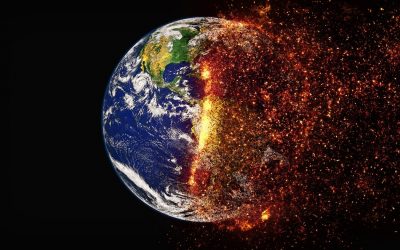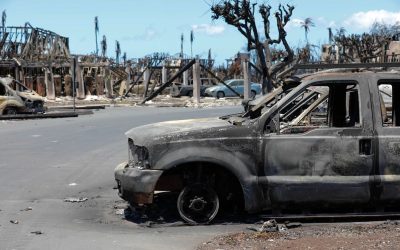As the Presidential race heats up, we’ll see candidates asked many “loaded questions” about climate—questions based on dubious assumptions that serve the questioner’s agenda.
Here are answers to 10 popular loaded climate questions.
1: Do you believe in “climate change”?
If by “climate change,” you mean some human impact on climate, yes. But I don’t believe in “climate crisis.” As the world has warmed ~1°C in the last century, climate disaster deaths have fallen 98% thanks in large part to fossil fuels. Fossil fuels’ CO2 emissions have contributed to the warming of the last 100 years, but that warming has been mild and manageable—~1°C, mostly in the colder parts of the world. And life on Earth thrived (and was far greener) when CO2 levels were at least 5 times higher than today’s. [1]

Fossil fuels have actually made us far safer from climate by providing low-cost energy for the amazing machines that protect us against storms, protect us against extreme temperatures, and alleviate drought. Climate disaster deaths have decreased 98% over the last century. [2]

“Do you believe in ‘climate change’?” is an extremely vague question. It doesn’t specify what the magnitude of the change is, to what extent it’s negative or positive, and to what extent it’s human-caused. Everyone “believes in climate change” at this level of vagueness. The intent of the vagueness of “Do you believe in climate change?” is to get you to say “yes” because you (correctly) believe in some human impact on climate, then take that “yes” to mean that you (falsely) concede a catastrophic human impact on climate—a “climate crisis.”
“Do you believe in climate change?” is also a misleading question, because it asks you to take a position only on the climate side-effects of fossil fuels (“climate change”) while ignoring their huge benefits (including their benefits in protecting us from climate danger).
For an in-depth explanation of why climate impact (“climate change”) is real, but “climate crisis” isn’t, read this.
2: Are you a “climate denier”?
I’m a climate thinker. I think about the climate side-effects of fossil fuel use in a precise, not exaggerated way, and I also think about the many benefits of fossil fuel use—including the climate benefits that make us safer than ever from climate. For more on how to be a “climate thinker,” read this.
3: What about the 97% of climate scientists who agree that we must rapidly eliminate fossil fuels?
The “97%” studies reflect widespread agreement that humans have some climate impact, not catastrophic impact. They don’t justify the disastrous policy of rapidly eliminating fossil fuels. For a full breakdown of the “97% of climate scientists agree” fallacy, read this.
4: Will you listen to the scientists on climate change?
In considering energy policy I will listen to accurate summaries of climate science, along with accurate summaries of other relevant fields such as energy economics. I will reject distortions and politicizations of science. For an in-depth explanation of what’s wrong with “listen to the scientists” or “listen to the climate scientists” on energy policy, read this.
“Listen to the scientists” on fossil fuel policy sounds compelling, because clearly we need info from climate scientists. But these scientists themselves are not qualified to make FF policy, because that depends on multiple fields, e.g., energy, economics, and adaptation.
— Alex Epstein (@AlexEpstein) February 23, 2023
5: What’s your plan to keep warming under the 1.5°C that scientists say is necessary?
The goal of rapidly eliminating fossil fuels to limit warming to 1.5°C since the 1800s—~0.5°C from today—in a world where far more people die of cold than of heat—is genocidal pseudoscience. [3] For an in-depth explanation of the murderous and pseudoscientific nature of the “1.5°C goal,” read this:
6: What’s your plan to rapidly reduce CO2 emissions?
Such a plan would be ruinous. CO2 emissions reduction can only be achieved humanely and practically long-term, by developing globally cost-competitive alternatives. I will liberate nuclear and other promising alternatives. For an in-depth explanation of a pro-energy, pro-human, pro-freedom approach to CO2 emissions, read this:
7: Will you join the world in pursuing net-zero by 2050?
No one is actually pursuing net-zero, and many parts of the world are increasing fossil fuel use, because for billions of people fossil fuels are the most or only cost-effective way to get the energy they desperately need.
8: How will you address the worsening extreme weather brought on by fossil fuels?
Actually, the world is experiencing unprecedented safety from extreme weather thanks to fossil fuels—because fossil fuels’ benefits in protecting us from extreme weather overwhelm any negative climate side-effects. For a refutation of 25 myths related to fossil fuels and extreme weather, read this.
9: What are you going to do about the deadly wildfires that climate change has made worse?
We must address the root cause of dangerous, out-of-control wildfires: “excess fuel load” from bad forest management. Climate is a minor variable that we have no near-term control over. For more on the true causes of and solutions to dangerous, out-of-control wildfires, read this.
10: How do you respond to the latest UN IPCC report in which scientists demand urgent climate action?
The IPCC “report” is a political document that distorts science by exaggerating our negative climate impacts ignoring our huge ability to master climate danger. For more on the political—and religious—nature of the Intergovernmental Panel on Climate Change, read this.
References
1. “The best estimate of CO2 concentration in the global atmosphere 540 million years ago is 7,000 ppm, with a wide margin of error.”
- Patrick Moore – THE POSITIVE IMPACT OF HUMAN CO2 EMISSIONS ON THE SURVIVAL OF LIFE ON EARTH
- Paleo-CO2
- NOAA – Climate change rule of thumb: cold “things” warming faster than warm things
2. For every million people on earth, annual deaths from climate-related causes (extreme temperature, drought, flood, storms, wildfires) declined 98%–from an average of 247 per year during the 1920s to 2.5 per year during the 2010s.
- Data on disaster deaths come from EM-DAT, CRED / UCLouvain, Brussels, Belgium – www.emdat.be (D. Guha-Sapir).
- Population estimates for the 1920s from the Maddison Database 2010 come from the Groningen Growth and Development Centre, Faculty of Economics and Business at University of Groningen. For years not shown population is assumed to have grown at a steady rate.
- Population estimates for the 2010s come from World Bank Data.
- Scripps Institution of Oceanography – The Keeling Curve




